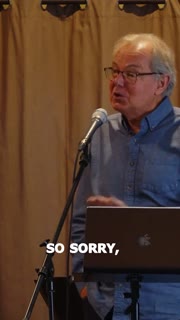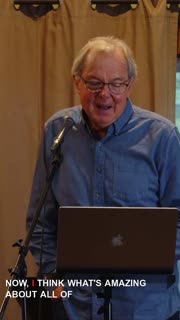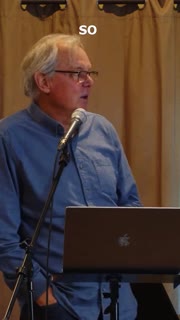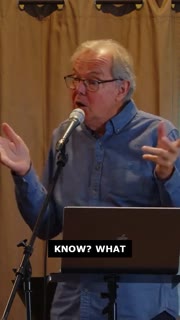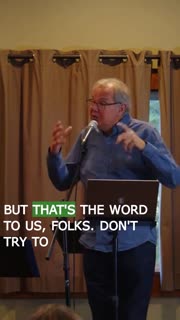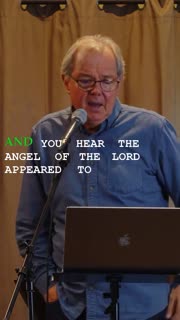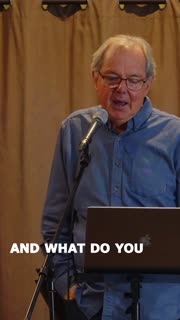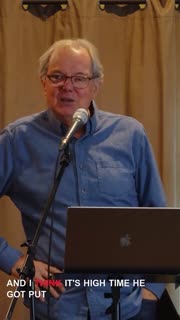Understanding God's Presence Through the Exodus Narrative
Devotional
Sermon Summary
Bible Study Guide
Sermon Clips
1) "So sorry, folks. The Christian thing is not about you. It's actually about who Jesus is and his being the one who gives us our identity. So whatever you do, please don't sell Jesus as your personal coach. Or your life guru. That's not what's going on here. He's the Lord of all creation. And we are made in his image. You've got to get that relationship straight, which happens very quickly in chapter three and then reiterated in chapter six." [02:36] (28 seconds)
2) "Now, I think what's amazing about all of this, there's a ton of stuff here. But you do know that Exodus was not written for scholars. Now, I do quite a bit of teaching in churches and I often hear from people, well, I'm not a scholar. And what they mean by that is I shouldn't have to think. And this should be easy at Sunday school level. Well, take that up with God, because that's not what he gave us. And that's one of the great things about Israel. Everyone else, they have to go to the special groups like the priest who read entrails. Watch where the birds fly, all specialized skills. Guys who could read dreams. But what Yahweh says is you don't have to go to the heavens. You don't have to cross." [03:33] (41 seconds)
3) "So Yahweh is not some little plastic figure you find in your cornflakes packet. This is serious, deep stuff. And that's why it engages people. So that's what strikes me about this. It's accessible to everybody, but it doesn't treat everyone like they're Sesame Street kids. There's profound stuff in this, because humans, I think, actually are profound beings. We're going to see some of that as we go through, I think." [04:24] (28 seconds)
4) "And what do you know? What great figure in Israel's kingship learned to be who he was by shepherding? David, right? Yeah. And who's Jesus? That great shepherd of the sheep. So that idea of shepherding is critical in understanding. So there he is shepherding. He's got sheep. Right? But he's also tried to do that before by killing the Egyptian. Right? And then trying to separate that fight he had to leave. Right? So that way of shepherding didn't work initially. But now he's learning some new shepherding, apparently." [14:05] (29 seconds)
5) "But that's the word to us, folks. Don't try to compete with the world's vision of what? What power is about? Don't do that in your church organization. We're not running business church. We're doing something different. So we've all talked about God taking David from behind the flock and Jesus being servant. It begins right back here. Where God just takes a humble bush, not a burning cedar. And Jesus himself talks about a mustard seed that grows. That's the image for the kingdom of God. It's a bush. It's not a great oak tree." [16:30] (35 seconds)
6) "And you hear the angel of the Lord appeared to him. Now, that's really unusual language. It doesn't occur anywhere else in this particular narrative. It's later picked up in the account of Exodus. And it's hard to tell if it's actually God, right? Or distinct from God. It's a really unusual term. We won't spend time here because it only appears once, and that's not the focus. But what it's telling you, that angel of the Lord is deeply connected with Yahweh, probably Yahweh himself, but in a sense distinct." [15:09] (32 seconds)
7) "And what do you hear then? The God of mercy. Out of his mercy, he hears this cry. I taught at Regent for many, many years. And you get these wonderful, keen students who felt the call of God. They'd actually sacrificed a lot. It's a massive cost to do that these days. And it's not just the fees. It's the loss of earning power for three years or something. That's huge. Okay? Okay? They give up all of that. They come along. It's Lord, I'm yours. And the first thing that happens is all the wheels start falling off. And they feel like God has just abandoned them. We're trying to do the right thing. How come this has happened?" [30:27] (38 seconds)
8) "And I think it's high time he got put back in the center again. This is about Jesus. How many of us, if we were given an hour, could sit down with someone and give them a good account of what Jesus is on about? We've got maybe Christmas, Nativity, Easter, a few stories about bread somewhere in the desert. And maybe he helped someone catch a lot of fish. And that's kind of, oh, he died for us. That is not Jesus. You can't build a life on that. Those gospels are much, much longer than anything like ancient. You can't build a deep life in a shallow view of Jesus." [33:51] (38 seconds)
Ask a question about this sermon
2) "Now, I think what's amazing about all of this, there's a ton of stuff here. But you do know that Exodus was not written for scholars. Now, I do quite a bit of teaching in churches and I often hear from people, well, I'm not a scholar. And what they mean by that is I shouldn't have to think. And this should be easy at Sunday school level. Well, take that up with God, because that's not what he gave us. And that's one of the great things about Israel. Everyone else, they have to go to the special groups like the priest who read entrails. Watch where the birds fly, all specialized skills. Guys who could read dreams. But what Yahweh says is you don't have to go to the heavens. You don't have to cross." [03:33] (41 seconds)
3) "So Yahweh is not some little plastic figure you find in your cornflakes packet. This is serious, deep stuff. And that's why it engages people. So that's what strikes me about this. It's accessible to everybody, but it doesn't treat everyone like they're Sesame Street kids. There's profound stuff in this, because humans, I think, actually are profound beings. We're going to see some of that as we go through, I think." [04:24] (28 seconds)
4) "And what do you know? What great figure in Israel's kingship learned to be who he was by shepherding? David, right? Yeah. And who's Jesus? That great shepherd of the sheep. So that idea of shepherding is critical in understanding. So there he is shepherding. He's got sheep. Right? But he's also tried to do that before by killing the Egyptian. Right? And then trying to separate that fight he had to leave. Right? So that way of shepherding didn't work initially. But now he's learning some new shepherding, apparently." [14:05] (29 seconds)
5) "But that's the word to us, folks. Don't try to compete with the world's vision of what? What power is about? Don't do that in your church organization. We're not running business church. We're doing something different. So we've all talked about God taking David from behind the flock and Jesus being servant. It begins right back here. Where God just takes a humble bush, not a burning cedar. And Jesus himself talks about a mustard seed that grows. That's the image for the kingdom of God. It's a bush. It's not a great oak tree." [16:30] (35 seconds)
6) "And you hear the angel of the Lord appeared to him. Now, that's really unusual language. It doesn't occur anywhere else in this particular narrative. It's later picked up in the account of Exodus. And it's hard to tell if it's actually God, right? Or distinct from God. It's a really unusual term. We won't spend time here because it only appears once, and that's not the focus. But what it's telling you, that angel of the Lord is deeply connected with Yahweh, probably Yahweh himself, but in a sense distinct." [15:09] (32 seconds)
7) "And what do you hear then? The God of mercy. Out of his mercy, he hears this cry. I taught at Regent for many, many years. And you get these wonderful, keen students who felt the call of God. They'd actually sacrificed a lot. It's a massive cost to do that these days. And it's not just the fees. It's the loss of earning power for three years or something. That's huge. Okay? Okay? They give up all of that. They come along. It's Lord, I'm yours. And the first thing that happens is all the wheels start falling off. And they feel like God has just abandoned them. We're trying to do the right thing. How come this has happened?" [30:27] (38 seconds)
8) "And I think it's high time he got put back in the center again. This is about Jesus. How many of us, if we were given an hour, could sit down with someone and give them a good account of what Jesus is on about? We've got maybe Christmas, Nativity, Easter, a few stories about bread somewhere in the desert. And maybe he helped someone catch a lot of fish. And that's kind of, oh, he died for us. That is not Jesus. You can't build a life on that. Those gospels are much, much longer than anything like ancient. You can't build a deep life in a shallow view of Jesus." [33:51] (38 seconds)
